The US Military & Climate Disruption
Air Date: Week of September 22, 2017
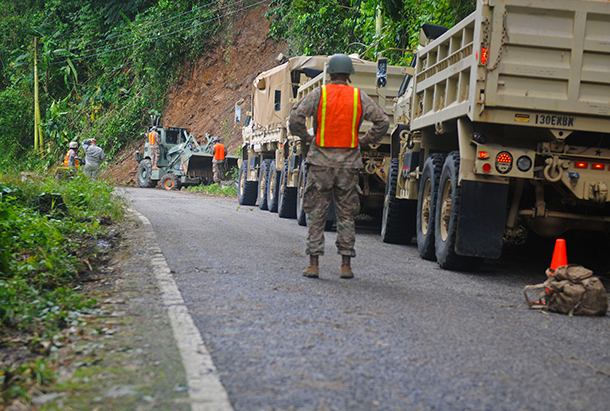
Citizen-Soldiers of the Puerto Rico National Guard worked on September 11th to clear a highway of debris after Hurricane Irma. Much more destruction came with Hurricane Maria’s direct hit to this island with 3.4 million US citizens just days later. (Photo: Spc. Agustin Montanez / The National Guard, Flickr CC BY 2.0)
Hurricanes Harvey, Irma and especially Maria all have one thing in common — the US military is in the front lines of response. Members of the National Guard, Navy, Air Force and Coast Guard are among many emergency responders mobilized immediately to help after such disasters. As retired Rear Admiral David Titley tells host Steve Curwood, though President Trump seems to discount the risk of climate change, the Department of Defense is focused on understanding and preparing for continued climate disruption and the security threats it poses in a warming world.
Transcript
CURWOOD: From PRI, and the Jennifer and Ted Stanley Studios at the University of Massachusetts Boston, this is Living on Earth. I’m Steve Curwood.
[HURRICANE SOUND]
CURWOOD: They say it’s like a freight train. Like a woman or a banshee screaming. And this summer hurricanes Harvey, Irma, Jose and Maria howled through trees, houses, schools and businesses, cascading water as they trashed Texas, Florida, Puerto Rico, and other Caribbean islands. Even as Commander-in-Chief Trump walks back U.S. climate leadership, his top military commanders are planning for climate-related threats and manning the front lines when they do happen.
Retired Rear Admiral David Titley led the US Navy’s task force on climate change and is now a Professor of Meteorology at Pennsylvania State University. David, welcome back to Living on Earth.
TITLEY: Thank you so much Steve, great to be back.
CURWOOD: Admiral, faced with the devastation in Puerto Rico, what kind of assistance might the U.S. military be likely to give?
TITLEY:The U.S. military will certainly be involved in the disaster relief, along with a lot of other federal Agencies. But just as an example, this morning the Kentucky National Guard is, or part of it, is on their way to Puerto Rico and these are very specialized airman who can get the airfields opening up again, because as you can imagine, when you have this massive storm comes across, you need to get help there but the airfields themselves can be compromised. The runways can be messed up, you don't have the air traffic control stuff any more, so the Air Force has specialists who can rapidly get an airfield back together. Similarly the Navy has people in naval oceanography, we call them a fleet survey team, that when we look at, say, the Port of San Juan, that's going to be need to be opened up so we can get a lot of stuff in there by ship, but my guess is the aids to navigation may be messed up, there might be silting, there might be obstructions in the channel. So all of that stuff has to get picked up rapidly. These are the kinds of capabilities that the Department of Defense will very likely be providing.
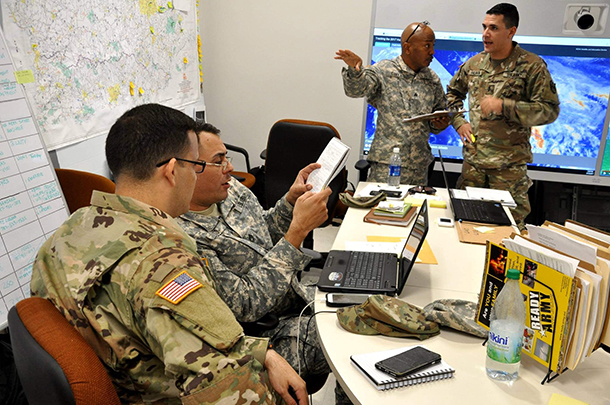
In the days before Hurricane Maria hit, the Puerto Rico National Guard coordinated with local emergency management agencies to prepare for the aftermath of the hurricane as well as deal with the continuing effects of Hurricane Irma. (Photo: Spc. Hamiel Irizarry / The National Guard, Flickr CC BY 2.0)
CURWOOD: And, as we saw in the aftermath of Katrina, the military can be essential for helping to keep order when the civilian authorities are overwhelmed or, frankly, out of commission because of the disaster
TITLEY: Yeah, there's I mean that the Department of Defense in these kind of humanitarian assistance and disaster relief operations is really very effective at being some of the first people on-scene, although I've I believe FEMA was stationed in places like Guantanamo Bay in Cuba so they can get there very quickly. So this is a team sport, this is inter-agency, it's not just the military but what the military can certainly
provide is communications, logistics, helicopters. Helicopters are worth their weight in gold in the first few days here because just so hard to get around a place. Intelligence, you know all those drones that we hear about and see about in the news, they can be used to really map out, where are people? Where do people need help? How to get water in and again helicopters can be very, very useful for that. Security, as you mentioned, there's probably tenuous security right now, I haven't seen reports, but after a major disaster security is certainly an issue and it's one of those things that the National Guard and the military working with the local authorities whatever local authorities are left and hopefully there are, can help to quickly reestablish order and that allows really everything else to and all the help and all the aid to follow through.
CURWOOD: What we're seeing in Puerto Rico, around Houston, what happened in the Keys, you know, this is in America, where thank heavens we have a fairly stable government system, but when it hits other places that aren't so stable it can really create regional, even international security situations. How important is it for the American military to pay attention to climate change as a security threat from abroad as well as at home?
TITLEY: One of the components of climate change that makes it a threat or a risk, if you will, to national security, is climate change can make already tenuous or frankly bad places much worse and occasionally catastrophically so. But so much depends on the local governance, on the inherent strength, the resilience of the communities affected. This is why you see people like Secretary Mattis talk so strongly about the need for not only the military to be funded but for adequate funding for U.S. Agency for International
Development, or USAID, for our State Department to be adequately funded, adequately manned, because, really, the military can come in initially and try to help stabilize the situation, but the military, the U.S. military is not going to be the one that rebuilds the societies. The military tends to turn these over either to places like the Red Cross, like, you know, large, sustained relief efforts but really for the stability we want our federal partners, really led by the Department of State but with expertise from many other
components of the federal government to play that role, to help stabilize that government because that's really a great way to buy down, if you will, the risk of climate change is to have governments who care about their people, who take care of their people and have the tools and means to do so.
CURWOOD: Now, under the Trump administration which has downplayed the risks of climate change, to what extent is the Pentagon factoring in climate change, climate disruption, as a security threat that requires planning?
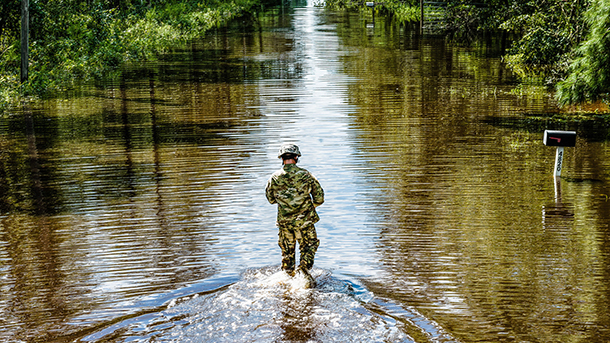
In the aftermath of Hurricane Irma, soldiers from the Florida National Guard performed high water search and rescue with members of the Coast Guard and St. Johns Fire Rescue and first responders, in Flagler Estates, Florida. (Photo: Ching Oettel / The National Guard, Flickr CC BY 2.0)
TITLEY: Well I think Secretary Mattis was pretty clear on this early on in his tenure as Secretary of Defense. During his confirmation hearing he was asked some written questions by congressional leaders as to how the secretary would see climate as a as a security risk or a security threat, and Secretary Mattis’s response was, he does understand and does see that the climate is changing and that those changes, if unmanaged, compose a risk to U.S. security operations and U.S. Department of Defense and he said, “Hey this is my job, it's my job to manage risks of all kinds, one of which, one of the many of which, is climate change”. So I thought the Secretary gave a very practical and pragmatic response. He's not going to put climate risk and climate change up on a pedestal and make it the one and only thing we worry about, but
he's also not saying, “Hey this doesn't exist or it's a hoax,” or you know all of the other things that we've heard from other parts of this administration.
In the Department of Defense. I kind of have a saying that says, “If the boss is interested, everybody else is fascinated,” and what that means is since you have the Secretary of Defense talking about climate and climate change in that way it then becomes much easier for his service secretaries, for his assistant secretaries, for the members of the Joint Chiefs of Staff to say, “Hey, look, we have these changes
and really for a lot of the readiness of the Department of Defense it doesn't even really matter whyit's changing, but we know it's changing. We know it's changing pretty quickly,” and we’d better be ready for that because if we just plan for the past we're going to be surprised and that's not where the Department of Defense wants to be.
CURWOOD: Now how is the Congress responding to the defense department's interest in studying climate change as a security threat?
TITLEY: Yeah, one of one of the things that to me has been really fascinating this summer is kind of the evolution of climate change as a security risk in our U.S. House of Representatives. So, of course we had the election in November, so, yes, it's a new house from where we were a year ago but one year ago the house with basically the same political makeup passed an Amendment to the National Defense Authorization Act, the main defense bill, that basically said, “Hey, the Department of Defense really should not be worrying about or thinking about climate as a, as a risk. We don't want you to do this now.” That did not survive through all the final negotiations, and it was not signed into law but that was where the house was.
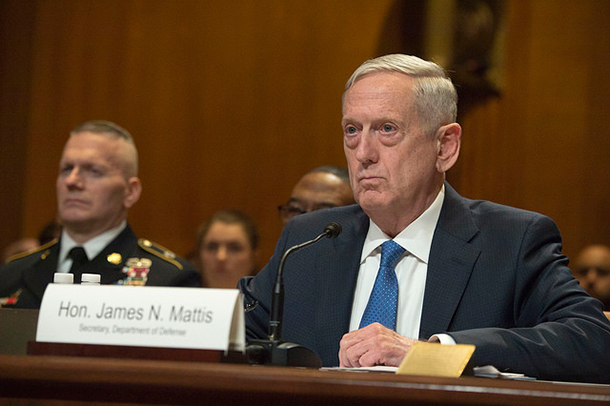
Defense Secretary James Mattis, seen above in March 2017 as he spoke before the U.S. Senate Committee on Appropriations, testified during his confirmation hearing in January 2017 that he understands the climate is changing and considers it among the many threats the military must be prepared to face. (Photo: Navy Petty Officer 2nd Class Dominique A. Pineiro / Department of Defense, Flickr CC BY 2.0)
Fast forward twelve months, you had Jim Langevin, Democrat from Rhode Island, put an amendment into the Defense Act that basically said, “Hey climate change is kind of a big deal especially along the coasts, and the Department of Defense should take this seriously and come back and tell the Congress exactly how you're managing that risk.” It went to the floor of the House and forty six Republicans basically voted to keep that language in the authorization bill, another eight Republicans abstained -- Maybe they realized they needed to freshen up their coffee at Starbucks. I'm not sure -- but that's
over fifty Republicans who, pardon the double negative, but did not vote against climate as a security risk. That's pretty significant I think. Senator McCain just this weekend talked about climate as a security issue.
So we're seeing this evolution in the Congress, maybe, despite all expectations given where the administration is, and I'm actually heartened by this. If you look at this administration I'm not sure they have an ideology on climate or climate change but what that means is, perhaps if the president sees a deal that he thinks is good or he likes it, there might be an opportunity here for, you know, almost a “Nixon to China” moment. Are the odds in favor? Maybe not, but the fact that we see the Congress moving and the
Republicans in Congress moving on this issue I think is a very encouraging sign.
CURWOOD: David, you actually lost a home down on the Mississippi coast at this train as massive storm surge back in 2005. What was it like to go through that experience?
TITLEY: Well, I guess the technical term is it sucks.
CURWOOD: [LAUGHS]
TITLEY: I have to say that my wife and I were probably some of the luckiest people on the Mississippi coast. We had almost none of our personal possessions in that house when the hurricane came, and we did have flood insurance, so financially I was covered. We were very lucky compared to so many others down there.
But I can tell you losing your home in a span of a few hours is a pretty traumatic experience. When we got back down there, it turned out that all we had is, you know, we were elevated to the FEMA flood standard, not that it did any good. So we had about half a dozen green posts sticking out of a concrete slab and there was really nothing else on our lot. So I tell people to this day, “When we lost our house we really literally lost our house.” We have no idea where it went. It either got sucked back out into
the ocean or maybe put up into the railway embankment along with pretty much everybody else's house. But the good news is I didn't have to clean up much on our, on our lot because it really was nothing.
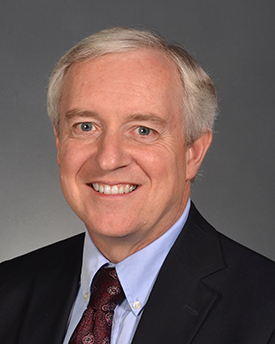
Rear Admiral USN (Retired) David W. Titley is a Professor of Meteorology and Founding Director of the Center for Solutions to Weather and Climate Risk at Pennsylvania State University. Now retired from the Navy, he initiated and led the US Navy Task Force on Climate Change. (Photo: courtesy of David Titley)
But then you're in the same position that everybody else is. You're trying to figure out just very basics like, where do you live, are you going to stay, are you going to go, are you going to rebuild? If you're going to rebuild, are you going to rebuild the same way that you had it before? Are you going to go up in elevation? are you going to go inland? How are you going to get the services? Because it's not only you, it's now, you know, one hundred thousand of your closest friends and neighbors want those exact same services at that exact same time. How do you know if you find a contractor that that contractor is a good person, that you're not going to get ripped off, it's not somebody who's kind of come in to take advantage of these situations? All of these things everybody is dealing with, and I'll guarantee you that people in Texas are dealing with this. Many people in Florida and tragically many people in the U.S. Virgin Islands as well as the other Caribbean nations and Puerto Rico are going to go through this, and it takes a long time. It takes years, and there's just nothing fun about it. It's just hard work, a lot of uncertainty, a ton of decisions. You spend a lot of time wishing that you could just have your life back like it was the day before the storm hit. It's hard, I really, really feel for the people that have been affected by these three storms.
CURWOOD: David Titley is a retired admiral and currently a Professor of Meteorology at Pennsylvania State University. Thank you so much, Admiral, for taking the time with us today!
TITLEY: Thank you so much Steve. I appreciate you having me on.
Links
ProPublica: “Trump’s Defense Secretary Cites Climate Change as National Security Challenge”
Living on Earth wants to hear from you!
Living on Earth
62 Calef Highway, Suite 212
Lee, NH 03861
Telephone: 617-287-4121
E-mail: comments@loe.org
Newsletter [Click here]
Donate to Living on Earth!
Living on Earth is an independent media program and relies entirely on contributions from listeners and institutions supporting public service. Please donate now to preserve an independent environmental voice.
NewsletterLiving on Earth offers a weekly delivery of the show's rundown to your mailbox. Sign up for our newsletter today!
 Sailors For The Sea: Be the change you want to sea.
Sailors For The Sea: Be the change you want to sea.
 The Grantham Foundation for the Protection of the Environment: Committed to protecting and improving the health of the global environment.
The Grantham Foundation for the Protection of the Environment: Committed to protecting and improving the health of the global environment.
 Contribute to Living on Earth and receive, as our gift to you, an archival print of one of Mark Seth Lender's extraordinary wildlife photographs. Follow the link to see Mark's current collection of photographs.
Contribute to Living on Earth and receive, as our gift to you, an archival print of one of Mark Seth Lender's extraordinary wildlife photographs. Follow the link to see Mark's current collection of photographs.
 Buy a signed copy of Mark Seth Lender's book Smeagull the Seagull & support Living on Earth
Buy a signed copy of Mark Seth Lender's book Smeagull the Seagull & support Living on Earth

